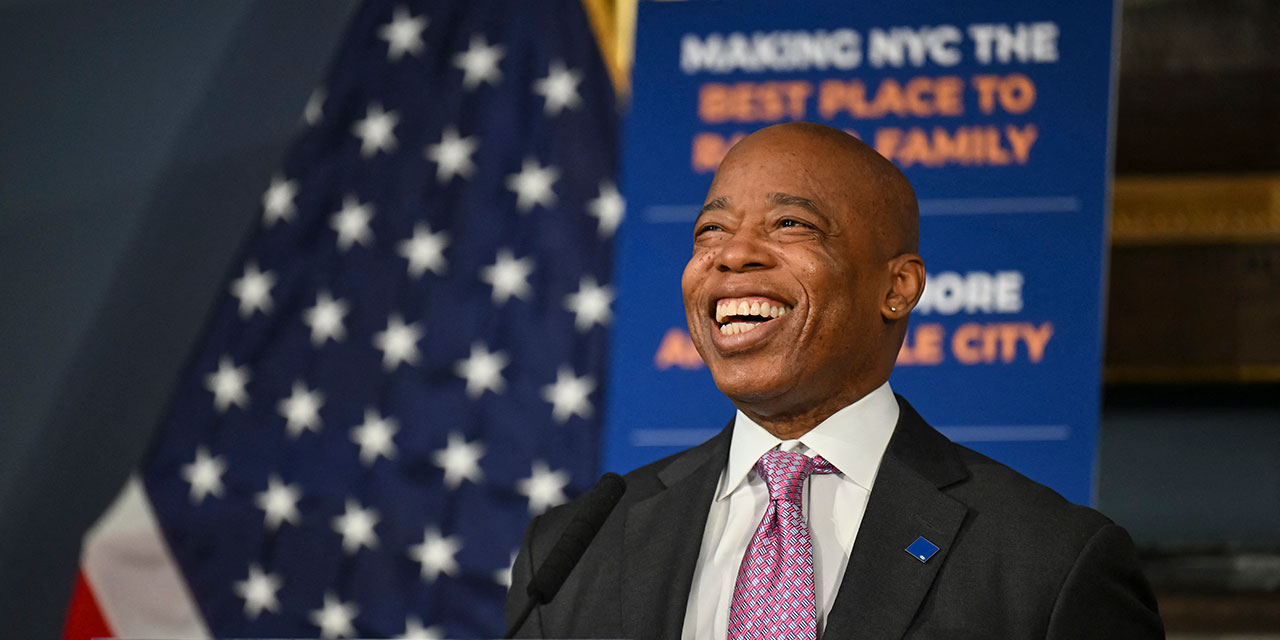
Mayor Eric Adams is off the hook. Earlier today, federal district court judge Dale Ho dismissed the corruption charges filed against Adams with prejudice, meaning they cannot be brought again. The decision, defying the Justice Department’s motion to dismiss without prejudice (meaning the charges could be reopened) marks the end of the first indictment of a sitting mayor of New York City—and the start of a new chapter in the 2025 mayoral race.
On September 26, 2024, then-Southern District U.S. Attorney Damien Williams filed a historic indictment against Adams. The charges included allegations that Adams illegally failed to disclose gifts from the Turkish government, improperly pressured fire department officials to sign off on safety clearances for the Turkish Consulate, and solicited donations from straw donors to conceal their foreign origins. These activities allegedly began during Adams’s tenure as Brooklyn borough president and continued into his mayoralty.
Finally, a reason to check your email.
Sign up for our free newsletter today.
Adams visited President Trump in January and February. Rumors circulated that the president was considering a pardon, viewing Adams as a fellow victim of the Biden administration’s politically motivated prosecutions.
Instead, on February 10, acting Southern District U.S. Attorney Danielle Sassoon received a memorandum from Deputy Attorney General Emil Bove directing her to dismiss the case against Adams without prejudice. Notably, the directive cited not the merits of the case but the Trump administration’s need for Adams’s cooperation in enforcing federal immigration laws. Instead of complying, Sassoon resigned, as did others. In the end, Bove signed the motion to dismiss.
Judge Ho then faced a difficult situation. Under Rule 48 of the Federal Rules of Criminal Procedure, the prosecution can only dismiss a case “with leave of court.” In considering such a motion, the judge may decide whether the dismissal should be with or without prejudice. That left Ho with three main options: reject the Justice Department’s motion; grant it without prejudice; or grant it with prejudice, thereby shielding Adams from future federal prosecution on these charges. Other possibilities—such as conducting further fact-finding—were unappealing, as they would have delayed the decision and likely interfered with the mayor’s reelection campaign.
Various local organizations—and even former federal judges—urged Ho to reject the dismissal. Doing so would have marked an extraordinary assertion of judicial power over the executive branch’s prerogative to conduct prosecutions. As Ho explained in his ruling, the judiciary cannot compel the executive to prosecute a case. In situations where an individual prosecutor is unwilling or unable to proceed, denying dismissal may allow for a new prosecutor to take over. But that would have made little difference here, where the unwillingness extended to the highest levels of the executive branch. Appointing a special prosecutor, as some advocated, risked triggering a constitutional crisis.
On the other hand, had Ho accepted the Justice Department’s motion in full, he would have left New York City vulnerable to the Trump administration reopening the case if Adams failed to meet its expectations. Rather than decide this politically and constitutionally fraught issue on his own, Ho appointed Paul Clement—a prominent conservative Supreme Court litigator and former solicitor general—to provide an opinion on the options available to the court and the most appropriate course of action.
On March 7, Clement issued his advisory brief, recommending dismissal with prejudice. The power to dismiss charges, he argued, exists primarily to protect the defendant’s individual liberty—for example, by upholding the right to a speedy trial against the prospect of charging, dropping, and re-charging a case. Given the separation-of-powers concerns, Clement noted that the court’s role was limited to choosing between dismissal with or without prejudice. But he warned that granting the Justice Department’s motion to dismiss without prejudice “could create the appearance, if not the reality, that the actions of a public official are being driven by concerns about staying in the good graces of the federal executive, rather than the best interests of his constituents.” In the end, Ho accepted this reasoning and followed Clement’s advice to dismiss the case with prejudice.
Though Adams is now free from the peril of these federal corruption charges, his recent poll numbers show that he’s still in trouble in the court of public opinion. Now running behind former governor Andrew Cuomo and socialist state assembly member Zohran Mamdani, the mayor must make up lost ground before the June 24 primaries if he hopes to secure the Democratic Party’s nomination.
No matter how hard Adams campaigns, he faces steep odds in June. New York representative Greg Meeks, boss of the powerful Queens County Democratic Party machine, endorsed Cuomo earlier this week, signaling that party elites know Adams won’t win the Democratic nomination again. Mamdani (along with three others) secured the endorsement of the Working Families Party. Progressive groups are urging their supporters not to rank Cuomo or Adams.
That said, it’s too early to count Adams out. Thanks to the impressive work of Police Commissioner Jessica Tisch, serious crime is down by about 11 percent so far this year. Murders are down 35 percent, with zero subway killings. Adams has $3 million in his campaign coffers, despite failing to qualify for matching public funds because of the straw-donor allegations. He also has until late May to decide whether to run in the general election as an independent. And with good odds that Mamdani secures the Working Families ballot line, the city could be on track for its first genuine multi-way general race since 1969.
Just when New York’s local election year seemed that it couldn’t become more chaotic, the dismissal of Mayor Adams’s corruption case adds yet another plot twist. With a crowded field of challengers and the potential for Adams to stand as an independent should he lose the Democratic primary, New Yorkers may not know how this story concludes until November.
Photo by ANGELA WEISS / AFP) (Photo by ANGELA WEISS/AFP via Getty Images
City Journal is a publication of the Manhattan Institute for Policy Research (MI), a leading free-market think tank. Are you interested in supporting the magazine? As a 501(c)(3) nonprofit, donations in support of MI and City Journal are fully tax-deductible as provided by law (EIN #13-2912529).
Source link
















